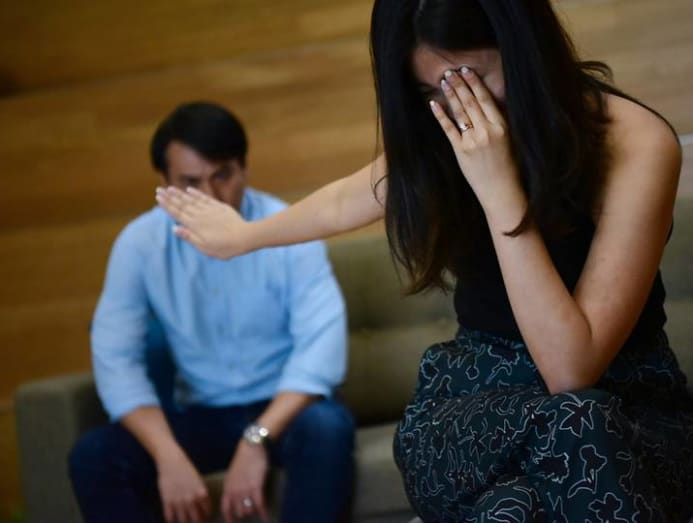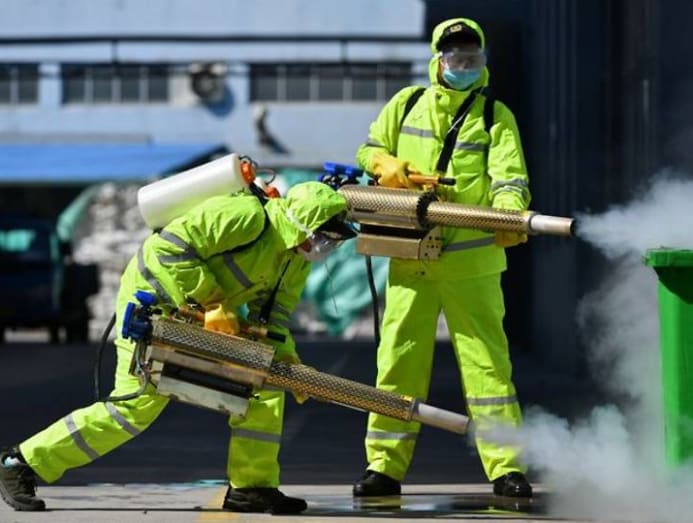Commentary: Isolated with your abuser? Why family violence seems to be on the rise during COVID-19 outbreak
SINGAPORE: Social isolation measures have been mandated effectually the world to contain the spread of coronavirus, but these have had undesirable side-effects.
Co-ordinate to Chinese daily The Global Times, the urban center of Xi'an has seen a tape-breaking book of divorce requests over the past few weeks.
Extended periods of time cooped upwardly with one's family may inadvertently atomic number 82 to rise tensions and conflict at dwelling. But self-isolation is putting some people's lives in serious danger of some other kind: Family violence.
Family violence is violent, threatening, coercive or controlling behaviour that occurs in current or onetime family, domestic or intimate relationships. It encompasses physical corruption, sexual assault, emotional and psychological abuse, economic command, social isolation and any other behaviour that may cause a person to alive in fearfulness.
READ: Commentary: A deep hurting but strong will to live - lessons from a survivor of abuse
READ: Commentary: She's practically asking for it? Practice Singaporeans subscribe to rape myths?
With social isolation measures, victims of family unit violence are now trapped at home with their abusers to an unprecedented degree. They are as well cutting off from the respite typically bachelor to them, such as going out to work or school.
This potential secondary outcome of the coronavirus crisis has not received the attention it deserves, despite by evidence that family unit violence rates ascent in the wake of emergencies such as natural disasters and disease outbreaks.
READ: COVID-xix temporary measures: Gatherings outside of school and work limited to x people, entertainment venues to close
Increment IN Family unit VIOLENCE NUMBERS
Advocates in Mainland china, the United States and Italy are all reporting a spike in victims reaching out to family violence hotlines and organisations. In Singapore, Enlightened's Women's Helpline has similarly seen a 33 per cent increase in Feb over family violence-related calls received in the aforementioned month final yr.
This increase stands in huge dissimilarity to national-level data from 2022 to 2019, which shows family violence on the decline equally evidenced by the number of personal protection guild applications filed.

Social workers AWARE spoke to recently reported similar increases in family unit violence cases and concord that isolation may be increasing the incidence of corruption, even as the circumstances and reasons that lead to people reaching out for help remains hard to establish even nether normal circumstances, let solitary during crises.
I social worker highlighted that sixty per cent of recent daily referrals had been family violence related, upwardly from 30 per cent terminal year. Another highlighted a couple of cases they saw that resulted in a sudden escalation in violence when families were given stay-at-habitation notices.
Information technology is too early on to say if this tendency will continue, but we should consider how better back up to victims can be provided while practicing social isolation or distancing.
READ: Commentary: COVID-xix self-isolation is punishing the poor in Indonesia
READ: Commentary: Don't forget the vulnerable in the fight against COVID-19
PANDEMICS AND Family unit VIOLENCE
Crises like pandemics and natural disasters may be accompanied by an uptick in family unit violence because of iii reasons. These reasons are closely associated with family violence'due south roots in power and control.
Offset, pandemics are typically situations in which people'southward lives may seem out of control. This could trigger abusers to lash out against their victims, in club to regain some semblance of control over a situation. An already abusive relationship may therefore worsen.
This may be why economic hardships themselves are a trigger for more than abuse in a relationship. A research report on intimate partner violence and the global financial crisis in the United states found that unemployment and economic hardship at the household level were positively related to abusive behaviour.
It also found that rapid increases in the unemployment rate increased men's controlling behaviour towards partners, fifty-fifty subsequently adjusting for unemployment and economic distress at the household level.
LISTEN: Women earning less than men: Who bears the brunt of change?

2d, social support – from family unit, friends or other sympathetic allies – is critical in helping family unit violence victims heal and build hope.
All the same containment measures, such every bit work-from-abode arrangements or when workers are put on enforced leave, increment social isolation. Many victims may also feel that they can no longer seek refuge at the home of a friend or relative, especially those with elderly residents or children, for fear they could expose their families to the virus.
Third, the coronavirus crisis is likely going to push button the earth economic system into recession, which will get in even more than difficult for victims to exit abusive relationships.
Leaving an abusive partner often involves establishing financial independence – for example, by keeping a secret savings account that the abuser cannot access – but this volition exist more hard if victims begin to lose jobs.
Low-income households are particularly vulnerable to such economic shocks.
Sentry: Low-income families deport the brunt of ongoing COVID-19 crisis
READ: Commentary: Why Singapore is preparing to tap the brakes to slow COVID-xix spread
NOT Everyone Tin Become HELP
Increased time spent at dwelling house may increase the incidence of family violence, as abusers and victims find themselves in close proximity 24/vii.
Just being forced to stay at home may as well impact a victim's help-seeking behaviour. Typically, victims call helplines and services when they are away from their abusers, such as at work, or out on an errand.
With more people spending fourth dimension indoors, victims may be afraid to reach out for assist, assessing that their abusers have a higher take a chance of finding out.
Services themselves might also be impacted as a issue of COVID-nineteen. For instance, crisis shelters may be taking necessary precautions to shut their doors if they deem the chance of infection to be high.

Helplines and social service organisations may be nether pressure level from increased demand and unable to respond promptly, especially if they aren't provided the necessary resources to adjust to higher demand.
Already in Singapore, at that place are reports of social service organisations' coffers running low, and non-profits seeing a dip in the number of volunteers offering to help.
ADDRESSING Family unit VIOLENCE DURING PUBLIC HEALTH EMERGENCIES
Lessons from previous pandemics, such as Ebola and SARS (which prompted similar spikes in reported family violence), indicate that vulnerable communities, particularly women, shouldn't be forgotten during public health emergencies.
Indeed, UN Women has besides called on governments to consider the disproportionate impact of the coronavirus pandemic on women, who make up the majority of workers in the health and social sector and the informal economic system.
READ: Commentary: COVID-19 will hit gig workers particularly hard
READ: Commentary: Still reeling from Duterte'southward war on drugs, Manila'south poor hit hardest by COVID-19
The Singapore Government has done a remarkable job in containing the spread of coronavirus while keeping the public informed of the number of people infected, who they came in contact with, and how they were infected.
Equally we begin to track the secondary effects of the coronavirus crunch, we must include the impact of family violence, and prioritise services providing crucial support to victims.
Any stimulus package can include specific plans to build the long-term economic resilience of all those who take been affected, especially family violence victims. This will exist crucial for them to maintain financial independence from their abusers.
The package can also provide financial and technological support to social service organisations so that they are not forced to scale back operations at this crucial time, and tin instead use this every bit an opportunity to take more of their work online.
If you or someone you know is experiencing family violence, y'all can reach out to Aware's Women's Helpline (1800 777 5555, Monday to Fri, 10am to 6pm), or to Family Violence Specialist Centres such as PAVE.
Shailey Hingorani is Head of Advocacy and Research at AWARE.
fullerposinion2001.blogspot.com
Source: https://cnalifestyle.channelnewsasia.com/commentary/commentary-isolated-your-abuser-why-family-violence-seems-be-rise-during-covid-19-outbreak-282661
0 Response to "Commentary: Isolated with your abuser? Why family violence seems to be on the rise during COVID-19 outbreak"
Enregistrer un commentaire